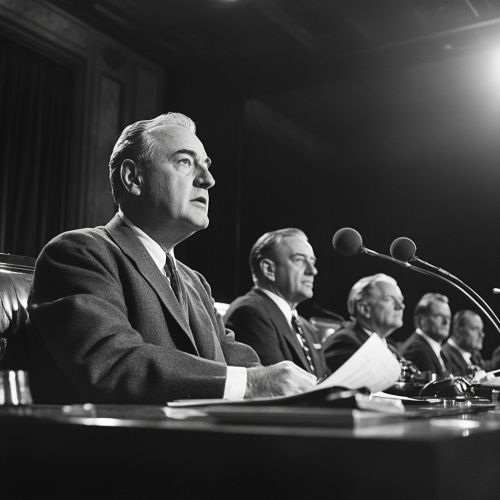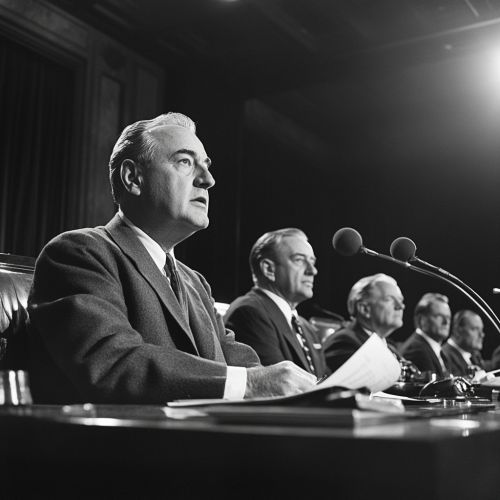Joseph McCarthy
Early Life and Education
Joseph Raymond McCarthy was born on November 14, 1908, in Grand Chute, Wisconsin. He was the fifth of seven children in a devoutly Catholic family. His parents, Timothy and Bridget McCarthy, were dairy farmers of Irish descent. McCarthy attended a one-room country school and later enrolled at Little Wolf High School in Manawa, Wisconsin, but he dropped out at age 14 to help on the family farm. He returned to school at age 20 and completed four years of high school in just one year. McCarthy then attended Marquette University in Milwaukee, where he studied engineering and law, earning his law degree in 1935.
Early Career
After graduating from Marquette, McCarthy was admitted to the bar and began practicing law in Shawano, Wisconsin. He quickly became involved in local politics and was elected as the youngest circuit judge in Wisconsin history in 1939. During his tenure as a judge, McCarthy was known for his energetic and sometimes controversial rulings.
Military Service
During World War II, McCarthy enlisted in the United States Marine Corps in 1942. He served as an intelligence officer and participated in combat missions in the Pacific Theater. McCarthy's military service was marked by his aggressive pursuit of enemy intelligence and his willingness to take on dangerous assignments. He was discharged with the rank of captain in 1945.
Political Career
Senate Election
In 1946, McCarthy ran for the United States Senate as a Republican, defeating incumbent Senator Robert M. La Follette Jr. in the primary and winning the general election. His campaign was characterized by its aggressive tactics and populist appeal.
Early Senate Years
During his first years in the Senate, McCarthy was relatively undistinguished. He focused on issues such as housing and veterans' benefits but struggled to make a significant impact. However, his fortunes changed dramatically in 1950.
McCarthyism
The Wheeling Speech
On February 9, 1950, McCarthy delivered a speech in Wheeling, West Virginia, in which he claimed to have a list of 205 communists working in the State Department. This speech catapulted him to national prominence and marked the beginning of the era known as McCarthyism.
Senate Permanent Subcommittee on Investigations
McCarthy became the chairman of the Senate Permanent Subcommittee on Investigations in 1953. He used this position to conduct a series of highly publicized hearings aimed at rooting out alleged communists in the government, the military, and other sectors of American society. These hearings were characterized by their aggressive questioning and often unsubstantiated accusations.
Army-McCarthy Hearings
In 1954, McCarthy's influence began to wane following the Army-McCarthy hearings. These hearings were televised and exposed McCarthy's aggressive tactics and lack of evidence. The turning point came when Army counsel Joseph Welch famously asked McCarthy, "Have you no sense of decency, sir?" This moment marked the beginning of McCarthy's decline in public and political support.


Censure and Decline
In December 1954, the Senate voted to censure McCarthy for his conduct, effectively ending his political career. The censure resolution condemned him for his actions during the investigations and his abuse of Senate privileges. Following the censure, McCarthy's influence and health declined rapidly. He became increasingly isolated and struggled with alcoholism.
Death
Joseph McCarthy died on May 2, 1957, at the Bethesda Naval Hospital in Maryland. The official cause of death was acute hepatitis, but it is widely believed that his heavy drinking contributed to his early demise. He was buried in St. Mary's Cemetery in Appleton, Wisconsin.
Legacy
McCarthy's legacy is a contentious one. While some view him as a patriot who sought to protect the United States from communist infiltration, others see him as a demagogue who used fear and intimidation to advance his political career. The term "McCarthyism" has come to symbolize the practice of making unsubstantiated accusations and using unfair investigative techniques.
